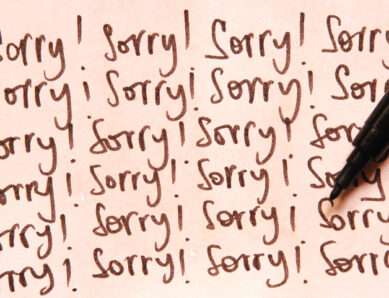Why is it that sometimes an apology is so difficult to make, and at other times we end up apologizing profusely and at length for things that weren’t our fault?
An apology can be a wonderful thing, so long as it is infrequent and from the heart.
Gary Hopkins. U.S. author
A few years back, I was a guest speaker at an event for professional trainers and facilitators. The audience was predominantly male. I was well prepared, knowledgeable about the topic, and I felt confident as I delivered my speech.
But afterward, a very experienced female delegate greeted me, offered a few pleasantries, then dropped a bombshell on me.
She said, “Do you know how many times you apologized, from the moment you stepped up to the microphone until the moment you left the stage?”
“None?” I replied.
“Nine. Nine times,” she said. “And all of them were unnecessary. You even said sorry when the sound wasn’t clear, and that wasn’t your fault at all.”
Why Do We Keep Apologizing?
I was speechless. It was the first time anyone had ever made me aware of my “sorry habit.” So what was the first word out of my mouth in reply? “Sorry!” We both burst out laughing.
Now that I was aware of this habit, I realized how often I apologized. It felt to me as if I started every other sentence with “sorry,” for no good reason. I didn’t see myself as someone with a meek, apologetic type of personality, so why was I doing it?
I realized that there was an element of it that was socialized into me. In our culture, children had to be seen and not heard. While it didn’t stay that way for boys, it did for girls. As a woman, I felt that I had to apologize for having strong opinions, and for not following societal norms and expectations, such as deciding not to have children.
There was a second element to it: guilt. I felt guilty for being more successful than many of my peers. I didn’t apologize for it explicitly, but I conveyed it through my attitude, and by saying sorry for lots of other things.
I concluded that I used unnecessary apologies as a type of cultural symbol, signalling two things: that I didn’t think too much of myself, and that I recognized the superiority of men.
When Apologizing Is Worthless
Of course, apologies shouldn’t be used that way. However, this incident raised my awareness of how we routinely use apologies, or apology words such as “sorry.”
First and foremost, there are real apologies. Wholeheartedly saying that you’re sorry when you’ve made a mistake or wronged another person is important. It’s a deposit into a relationship account, and there’s no substitute for an apology.
Depending on the situation, an apology on its own isn’t always enough. If your offending behavior doesn’t change, your apology is worthless.
People often use “exemption” apologies when their habitual lack of self-management leads to behavior such as lateness and missed deadlines.
They use sorry as a “get out of jail” card when they’re in the wrong. They’ll start a conversation with an apology in an attempt to exempt themselves from negative consequences. It’s also a way of trying to prevent another person (usually an authority figure) from being angry with them.
Sorry as a Tool of Manipulation
False apologies are tools of manipulation. An example of this is when a seemingly contrite person says they’re sorry for being unfaithful to their partner. Their concern isn’t for the relationship. It’s about how a possible breakup will impact them financially.
Another type of false apology is when the apologist is sarcastic or shifts the blame. “I’m so sorry I raised my voice, but your behavior made me angry,” is a typical example.
False apologies can also be a dramatic attempt to make things seem different from what they really are.
Habitual apologies are the ones you make when you didn’t do anything wrong. You’re saying sorry because you don’t want to anger someone else, you’re not used to asserting your boundaries, or you’re not sure how the other person will receive your position/opinion. The word sorry is then used as a soft entry.
How to Stop Apologizing
I’m sorry that it took me so long to explain my opinion about apologies, but… No! Truth be told, I’m not sorry at all.
During our #MTtalk Twitter chat, we talked about how to stop apologizing for the wrong reasons. Here are the questions we asked, and a selection of your excellent responses:
Q1. Failing to apologize is a big mistake, but so is over apologizing. How can you tell when or when not to apologize?
@SustainedLeader When your “I’m sorry” becomes a perfunctory automatic response, without any real thought or sincere feeling behind it, you need to stop diminishing the importance and impact of a genuine apology.
@ColfaxInsurance I have a pretty hard time distinguishing the difference here, but I’ve started asking myself, “Did I actually do anything wrong?” when I get the urge to apologize. It’s helping, but I’m not over the habit of over-apologizing yet.
Q2. In which situations do you tend to apologize unnecessarily?
@TwinkleEduCons When we fear the other person’s reaction or don’t feel confident in ourselves or the situation.
@Midgie_MT I used to apologize unnecessarily when I felt like I wasn’t good enough or that I had not done enough, or when I made a small mistake.
Q3. Why do we over-apologize?
@TheToniaKallon Over-apologizing tends to happen when there’s a lack of confidence in your position. By that, I mean there’s an appropriate apology response based on a situation, but going overboard signals something deeper.
@_DerekWrites I just feel it’s safe to assume that part of any problem was likely my fault, so I should just get ahead of it with an apology upfront.
Q4. Culture and gender influence how much people apologize. True or False?
@J_Stephens_CPA It seems to me that men are given more leeway, while women are expected to apologize more.
@lg217 I agree with that statement. I feel that the culture we were bought up in, as well as our gender, play key roles in how we apologize.
Q5. When shouldn’t a manager apologize, and why?
@Yolande_MT A manager shouldn’t apologise for being truthful. They should take care to deliver the truth in a kind manner, though.
@emapirciu A manager shouldn’t apologize for his [sic] decisions. Sometimes things must be done. Apologizing would make the decision look like a personal choice instead of a necessary strategic move.
Q6. Whatever your role, how can you stop apologizing unnecessarily?
@MicheleDD_MT Increase your self-awareness. Find out what is causing you to over-apologize. Change your language and replace the “sorry.”
@SanabriaJav Know what you want to say from the start. If it’s a difficult conversation to have, start with something positive before you get into the critique. Have conviction.
Q7. When is an apology simply not enough?
@SizweMoyo When the apology does not address the issues at hand, but instead dismisses them, then an apology isn’t enough.
@MarkC_Avgi There are those who live by the mantra, “It’s better to ask for forgiveness (with an apology) than to ask for permission.” People who live by that mantra, constantly doing things that hurt others and then always apologizing… their apologies are simply not enough.
Q8. What impact does it have on you if a person expects an apology to be the end of the matter?
@NgukaOduor It usually makes me cut ties or quit the relationship. That means trust is broken. More action or a change of behavior creates more impact than just an apology.
@TwinkleEduCons My immediate impression of them is that they do not believe that I matter, and that they are all important. A glib “sorry” then moving swiftly on shows a lack of care or genuine accountability. Someone whose ego is overinflated.
Q9. When does apologizing become manipulative or dishonest?
@JKatzaman Apologies are manipulative when you say you’re sorry in advance, sort of a sale of indulgences.
@Yolande_MT It’s manipulative and dishonest to use an apology to smooth things over so the other person can “let it go,” especially if you don’t have any intent to really work on the issue.
Q10. From now on, how will you help others who apologize unnecessarily, too easily, or dishonestly?
@ColfaxInsurance Ask them what the next step is. What’s their plan to change a behavior? How are they going to practice mindfulness? What is their intention with the apology? What are they actually apologizing for?
@MicheleDD_MT Unnecessarily? Call it out. “Do you realize that you… ?” Dishonestly? “That doesn’t feel like an apology to me. When you said … it felt like you were putting the blame on… “
To read all the tweets, see the Wakelet collection of this chat, here.
Coming Up
A lack of assertiveness may manifest as over-apologizing. However, protecting your boundaries is actually the one thing you never have to apologize for. In our next #MTtalk chat, we’re going to talk about boundaries and how well they serve you. In our poll this week, we’d like to know which of your boundaries you find most difficult to maintain. To see the poll and cast your vote, please click here.
Useful Resources
In the meantime, here are some resources to help you to understand assertiveness and setting boundaries. Some of them may only be available in full to members of the Mind Tools Club.




